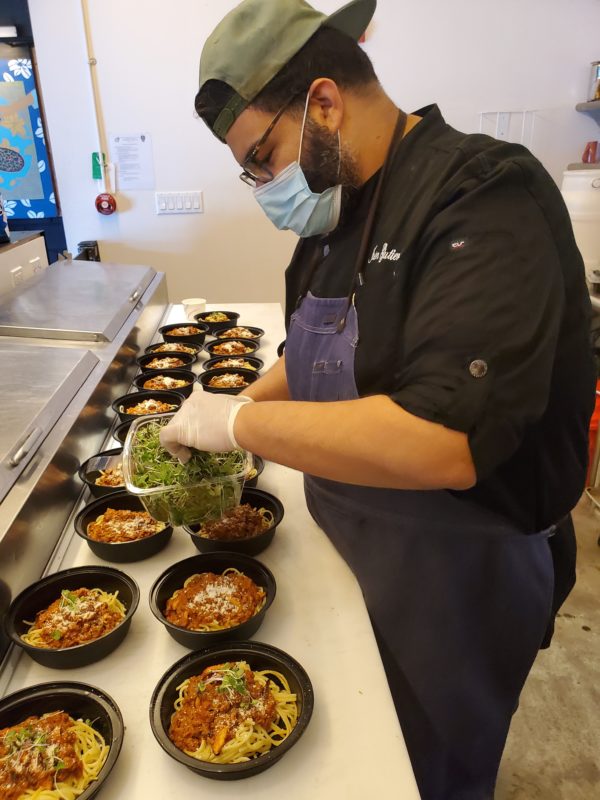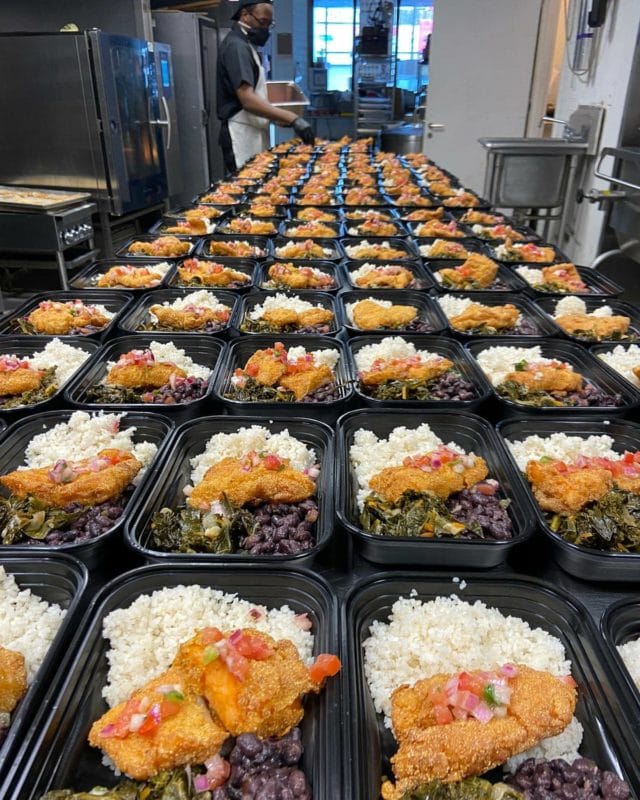Brownsville’s Collective Fare Is Feeding Thousands of Food Insecure New Yorkers


When COVID-19 hit the city, the founders of Collective Fare, an education and catering company in Brownsville, knew that something would have to give.
“We lost over $150,000 worth of catering contracts,” Collective Fare’s co-founder and Director of Operations, LaToya Meaders, told us. Laughing, Meaders said that she still gets a notification bell each day that an event, now canceled, had been scheduled for. Collective Fare operates out of Brownsville Community Culinary Center (BCCC), and their business was primarily from large corporate clients. With all events canceled for the foreseeable future, Collective Fare’s revenue has all but disappeared.
In March, Meaders said, she and co-founder and Executive Chef Femi Rodney Frazer were looking to relaunch the entire space, opening up a café along with a small-business coworking incubator space. Then the city went into lockdown, throwing everything into question.
Meaders and Frazer realized that the food insecurity already facing the Brownsville community was only going to get worse.
“How do you handle a crisis when you’re already in crisis?” Meaders said, quoting Frazer. “That pretty much sums up what Brownsville has been going through over the past 50 years. This is not something new.”
Meaders and Frazer dug into the paltry amount of money left in the business, as well as their own personal savings, to begin providing meals for up to 400 seniors and immunocompromised individuals per day through the Meals for All Initiative, which they co-founded with BCCC and now run with General Manager Jorge Castillo.
“We knew that during that time, the best thing that we can do is to provide these meals and help people be able to stay home so they don’t become at-risk to themselves or to one another,” Meaders said.
The logistics were never an issue, Meaders explained. “Us being caterers, it was already sort of in our bag, because this is something that we do. We go out, we locate clients, we provide food for them. We provide food in massive quantities, which is easy for us.” The only problem, she said, was finding the funding.
In late March, Rethink Food NYC Inc reached out.
“Rethink came in as our literal resuscitation mask,” Meaders said.
Rethink is a nonprofit organization that utilizes food excess from restaurants, grocery stores, and corporate kitchens to feed New Yorkers in need. Thus far, they’ve helped Collective Fare scale up from 400 to 800 meals per day. And, since Collective Fare is a catering company, Rethink brought them on as one of the first participants in their Restaurant Response Program, launched to keep restaurants in business during COVID-19.
Through the program, Rethink has supplied Collective Fare with a grant, made up of funds raised from corporate and individual donors, to keep them in operation and continue paying their staff. While Rethink declined to release the exact grant amount, they did say that they’ve provided up to $40,000 to their program participants.
Collective Fare has also since begun working with additional organizations, like World Central Kitchen, bringing their daily meal count up to 2,000. Now, Meaders said, they’re feeding family centers, police departments, and local hospitals along with seniors and the immunocompromised. They’ve also managed to build their team out significantly, increasing their staff from 6 people to 30.

The meals, which change seasonally, center on flavors and preparations from the Afro-diaspora, Meaders explained – think spicy jerk chicken with a watermelon ginger salad, one of their current featured meals. Meals are also healthy, Meaders said, to help mitigate the community’s lack of access to fresh, unprocessed foods, and tailored to the dietary needs of their recipients, many of whom are seniors or live with health issues.
Collective Fare also launched a meal kit delivery service that helps bring in revenue. That way, Meaders said, they can employ graduates of the BCCC culinary training program.
“It wasn’t just about feeding those in need,” she said. “It was also about keeping the people that we had already obligated ourselves to – to train — it was about keeping them employed.” When they heard that the restaurants these graduates were working in, like Cosme, Eleven Madison Park, and Mad Hatter, were going to close, they tried to think of ways to keep them in jobs.
It was Rethink’s model – to help restaurants and food service companies help themselves, rather than rely on a government loan – that made them an ideal fit for Collective Fare, Meaders said. Though she applied for a PPP loan to keep the business afloat, she said, she had little hope of actually receiving any help. “Anybody in food service knows, it’s rare that you take out a loan to open a restaurant – that’s just not something we do,” Meaders said. “Why would you expect the government to come in and save you during this time?”
Meg Savage, Executive Director of Rethink, explained that Collective Fare is a unique case, as they are a for-profit business that also provides free meals for their community. If they were forced to shut down, Savage explained, “that would have not only shut down a local business, but it would have shut down a local community’s access to food at this time.”
While Rethink helped keep them going, Savage said, Collective Fare are the ones who deserve all the credit.
“They’re on the front line, putting themselves in danger by getting out, commuting to work every day, feeding those in need.” Savage said. “We are just so thankful that we are able to keep their doors open. They’re going to be able to sustain through this – and not only sustain, but also help sustain their community.”
In addition to helping them stay in business, Rethink has also helped Collective Fare plan for an uncertain future.
“We’re never going to be able to do what we used to do before,” Frazer told us. What the restaurant industry needs to do now, he believes, is to find a way to pivot towards a new normal – a concept the food service industry as a whole has had to grapple with. What Rethink has provided for Collective Fare, Frazer said, is not only the money and resources they’ve provided, but the open-mindedness required to adapt to a hospitality industry changing rapidly due to COVID-19.
Even when COVID-19 ends, Meaders said, she sees the partnership with Rethink continuing. Both Collective Fare and Rethink uphold what is, essentially, the same mission — to improve communities through access to fresh, good-quality food.
“Access to food is something that should never be negotiated – that should never be put aside,” said Meaders.



